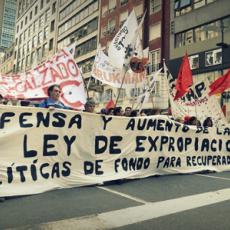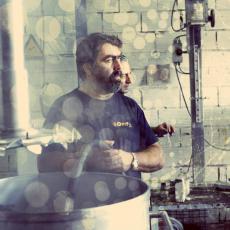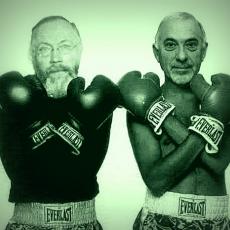A Reply to Daguerre, Ozarow and Upchurch
This is a reply to the workerscontrol.net article "Spectrum, Trajectory and the Role of the State in Workers’ Self-Management", especially on its treatment of the parecon model.
This is a reply to a specific part of this article: http://www.workerscontrol.net/authors/spectrum-trajectory-and-role-state-workers%E2%80%99-self-management
In the fifth paragraph the authors of this article mention the participatory economics (parecon) model - as developed by Albert and Hahnel. As an advocate of that model I want to address what seem to me to be some misunderstandings of the way in which the authors understand parecon.
Their opening sentence of that paragraph sets the scene as follows:
“While classical Marxists have drawn caveats on the sustainability of self-management and workers’ control within capitalism, others have been more circumspect.”
Adding that:
“The caution focuses on the nature of the state and the assumed (by Marxists) need to overthrow the (capitalist) state to achieve workers’ control of the productive process.”
Now the first thing to point out here is that Marxists certainly are not the only people in history to think this (although, for some strange reason, they do have a habit of presenting themselves in this way). As far as I am aware, in fact, virtually every revolutionary socialist (of which Marxism is only one branch) more or less take such insights for granted. It is also important to point out here that the 20th century has clearly shown that the removal from power of the capitalist class does not automatically result in workers control. Rather, what Marxists call a workers state typically manifests as coordinator class rule (more on this below). However, Marxists are blind to this for the simple reason that their ideology does not allow for a third class that sits between capitalists and workers. This is the key insight that informs the parecon model and the authors of this article have nothing to say about it.
They then go on to say:
“Hahnel and Albert (1991) and Albert (2003), from an anarchist perspective, introduce the concept and guide to practice of ‘participatory economics’, or ‘Parecon’.”
It is not my understanding that either Albert or Hahnel developed the participatory economics model from an “anarchist perspective”. Rather, their interest was in developing a theoretically sound model of a classless economy using clearly defined concepts, reason and logic. This, I would have thought, would be of interest to any serious socialist (whether Marxist or anarchist or otherwise) and I am inclined to view this characterisation as having two negative functions. The first is that it helps to maintain and perpetuate the tensions between these two revolutionary socialist camps - a dynamic that only serves the interests of the capitalist-state system. The second is that it allows ideologically driven activists not to consider ideas and arguments that challenge their chosen belief system. Such an approach to organising, it seems to me, is motivated by a desire to win an ideologically driven argument rather than by an interest in effective organising.
They continue:
“Parecon is presented as an alternative to both capitalism and what is described as ‘co-ordinationism’, or rather Communist command economy planning.”
This is more or less correct (although it is coordinatorism not “co-ordinationism”). But what the authors fail to highlight is the reasons behind the need for a classless alternative to both capitalist and communist economics. The class analysis that informs the parecon model understands both capitalist and communist economics as being modes of production, allocation and consumption based on class exploitation and oppression. In the capitalist system the capitalist class is dominant. In the so called communist system the coordinator class - defined by Albert and Hahnel as “Planners, administrators, technocrats, and other conceptual workers who monopolise the information and decision-making authority necessary to determine economic outcomes” - is dominant. As also pointed out by Albert and Hahnel, in a coordinator economy “traditional workers carry out their [the coordinator class] orders”. Furthermore, the sources of economic power are different for the capitalist class and coordinator class - for the former it is private ownership of the means of production and for the latter it is the corporate division of labour. It is important to notice that the corporate division of labour is maintain within most Marxist parties and so call workers states and it is for this reason that advocates of the parecon model typically understand such organisations as manifestations of coordinator class ideology. This, again, is something that I would have thought socialists would have been interested in and yet the authors simply gloss over it as if it is of no value or relevance to the general topic of workers control. I think that Marx, himself, would have encouraged people to look at the actual structures of the workers party / state to check to see that it is in fact a structure that functions in the interests of the workers and not just assume that it does for ideological reasons - and this is all that Albert and Hahnel have done.
Next, the authors point out:
“Participatory economics presents a programme for which the constraints and disciplines of the market may be overcome by an alternative framework of indicative pricing and negotiated planning ‘from below’.”
It is true that one aspect of the parecon model is what is called “participatory planning” which is designed and presented as a classless mode of allocation and therefore an alternative to markets. However, participatory planning is also an alternative to central planning which, in line with the above analysis, is understood as a form of coordinator class control over allocation. In this sense the participatory planning process is a very important inovation - at least for those who are interested in classless economics and genuine workers control.
All of the above leads the authors to their grand conclusion:
“The challenge to the power of capital, and hence the capitalist state, is avoided by assuming that a system of participatory economics could be achieved by a ‘long march’ which emphasises ‘councils of workers and consumers’ as intermediary institutions (Hahnel and Albert, 1991)”
This is also misleading in a number of ways. First of all self-managed worker and consumer councils are not presented as “intermediary” structures but rather as key institutions that make up the parecon model. It is these institutions - which are self-managed - that represent the direct challenge to the dominance of capitalist (and coordinator) class rule. Second, the theoretical framework in which Albert and Hahnel work - which was developed as an alternative to the Marxist historical materialism - deals with the issue of the state within the political sphere (on this, see Steve Shalom work). It is therefore unfair of the authors to say that the issue of state is “avoided”. It is not avoided at all, it is just dealt with in the appropriate sphere.
The authors begin the sixths paragraph as follows:
“Transformation is seen as something which gradually evolves from below rather than something which challenges capital and state power directly in an historical moment of confrontation.”
In fact the parecon model - as a vision - has no particular position on the question of whether its challenge to capitalism would occur “gradually” or in a “historical moment” - whatever that might mean. This formulation represents yet more confusion, on behalf of the authors, over what the parecon model actually is. Parecon is a vision for a classless economy not a programme for social revolution. That said, this vision can be used to inform strategy for economic justice and therefore constitutes an important part of an over all revolutionary programme. Depending on the specific circumstances, that strategy may or may not involve the state. But, as already noted above, it is important to understand that the parecon model is an economic model and not a political model and therefore does not directly address the question of the state, and nor should it.






Comments
Post new comment